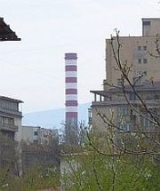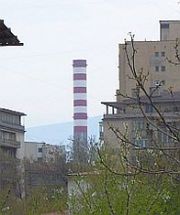
2008 Bulgarian energy crisis
Encyclopedia

Bulgaria
Bulgaria , officially the Republic of Bulgaria , is a parliamentary democracy within a unitary constitutional republic in Southeast Europe. The country borders Romania to the north, Serbia and Macedonia to the west, Greece and Turkey to the south, as well as the Black Sea to the east...
. The crisis affected more than a million households mainly in in the capital Sofia
Sofia
Sofia is the capital and largest city of Bulgaria and the 12th largest city in the European Union with a population of 1.27 million people. It is located in western Bulgaria, at the foot of Mount Vitosha and approximately at the centre of the Balkan Peninsula.Prehistoric settlements were excavated...
but also in Burgas
Burgas
-History:During the rule of the Ancient Romans, near Burgas, Debeltum was established as a military colony for veterans by Vespasian. In the Middle Ages, a small fortress called Pyrgos was erected where Burgas is today and was most probably used as a watchtower...
, Pleven
Pleven
Pleven is the seventh most populous city in Bulgaria. Located in the northern part of the country, it is the administrative centre of Pleven Province, as well as of the subordinate Pleven municipality...
, and Vratsa
Vratsa
Vratsa is a city in northwestern Bulgaria, at the foothills of the Balkan Mountains. It is the administrative centre of the homonymous Vratsa Province. As of February 2011, the town has a population of 60,482 inhabitants....
. As of late September 2008, the issue was not resolved.
Background
Bulgaria imports natural gasNatural gas
Natural gas is a naturally occurring gas mixture consisting primarily of methane, typically with 0–20% higher hydrocarbons . It is found associated with other hydrocarbon fuel, in coal beds, as methane clathrates, and is an important fuel source and a major feedstock for fertilizers.Most natural...
from Russia
Russia
Russia or , officially known as both Russia and the Russian Federation , is a country in northern Eurasia. It is a federal semi-presidential republic, comprising 83 federal subjects...
. It is used in combined heating plants in most Bulgarian cities, producing electricity during the summer
Summer
Summer is the warmest of the four temperate seasons, between spring and autumn. At the summer solstice, the days are longest and the nights are shortest, with day-length decreasing as the season progresses after the solstice...
months and heat during winter
Winter
Winter is the coldest season of the year in temperate climates, between autumn and spring. At the winter solstice, the days are shortest and the nights are longest, with days lengthening as the season progresses after the solstice.-Meteorology:...
. In 2001 the Russian Gazprom
Gazprom
Open Joint Stock Company Gazprom is the largest extractor of natural gas in the world and the largest Russian company. Its headquarters are in Cheryomushki District, South-Western Administrative Okrug, Moscow...
signed an agreement with the then Bulgarian Energy Minister Rumen Ovcharov that Bulgaria will receive Russian gas at lower cost as a way to compensate for transit Russian pipes to other parts of Europe
Europe
Europe is, by convention, one of the world's seven continents. Comprising the westernmost peninsula of Eurasia, Europe is generally 'divided' from Asia to its east by the watershed divides of the Ural and Caucasus Mountains, the Ural River, the Caspian and Black Seas, and the waterways connecting...
. Gas remained relatively cheap in Bulgaria until 2008 when Gazprom changed the terms of the contract. By then the price of gas had skyrocketed and Gazprom refused to sell cheap gas to Bulgaria.
Meanwhile, a large embezzlement
Embezzlement
Embezzlement is the act of dishonestly appropriating or secreting assets by one or more individuals to whom such assets have been entrusted....
scandal raged in Sofia. The managing director of the central heating plant in Sofia Valentin Dimitrov was charged with fraud and stealing more than one million lev from the company. The trial is ongoing. A new board of directors was appointed. The citizens of Sofia were unable to pay the higher bills and some outright refused which in 2008 led to huge losses of the Toplofikacia company and it ran into debt with the Bulgarian energy provider Bulgargas. Less than 50% of Sofia residents paid their bills regularly. Bulgargas started reducing the amount of gas to the company saying payment was long overdue.
Vicious circle
With more than 50% of all consumers in Sofia refusing to pay their bills, Toplofikacia ran into debt with the Bulgarian energy provider Bulgargas. Bulgargas in turn said it was no longer able to pay to the Russian giant GazpromGazprom
Open Joint Stock Company Gazprom is the largest extractor of natural gas in the world and the largest Russian company. Its headquarters are in Cheryomushki District, South-Western Administrative Okrug, Moscow...
. Gas supply has been restricted and even shut down in some cities. On September 25 Toplofikacia Sofia issued a statement saying it will not be able to provide enough heat to all residents of Sofia and that winter was fast approaching. As of late September the issue is unresolved.
Shutting down pipes
Bulgargas shut down pipes providing gas to heating plants in VratsaVratsa
Vratsa is a city in northwestern Bulgaria, at the foothills of the Balkan Mountains. It is the administrative centre of the homonymous Vratsa Province. As of February 2011, the town has a population of 60,482 inhabitants....
, Burgas
Burgas
-History:During the rule of the Ancient Romans, near Burgas, Debeltum was established as a military colony for veterans by Vespasian. In the Middle Ages, a small fortress called Pyrgos was erected where Burgas is today and was most probably used as a watchtower...
and Pleven
Pleven
Pleven is the seventh most populous city in Bulgaria. Located in the northern part of the country, it is the administrative centre of Pleven Province, as well as of the subordinate Pleven municipality...
. Hospitals and kindergarten took emergency measures and installed boilers. Toplofikacia Sofia shut down the hot water of more than 100 buildings in Sofia where 90 to 100 percent of residents refused to pay.
Political reaction
The Bulgarian energy minister Peter Dimitrov said customers were to blame as they refused to pay their bills. He said the municipality should help the company. The mayor of Sofia, Boyko BorisovBoyko Borisov
Boyko Metodiev Borisov is a Bulgarian politician who has been Prime Minister of Bulgaria since July 2009. Previously he was Mayor of Sofia from 8 November 2005 until his election as Prime Minister....
said the state should interfere. As of late September 2008 the issue is unresolved and Gazprom will shut down supply of gas to all companies who were in debt, including the four plants in Sofia.
Fears of grid failure
The combined heating plant in Sofia produces heat and electricity from natural gas. With supplies rapidly diminishing and winter fast approaching, more and more residents are switching on electrical heating devices and also boilers for hot water which usually Toplofikacia supplies. The National Electricity Company NEK EADNEK EAD
Natsionalna Elektricheska Kompania NEK is the Bulgarian national electricity distributing company also being the second largest company in Bulgaria...
said grid failure was imminent if all households start using electricity for heating in the cold winter months.

